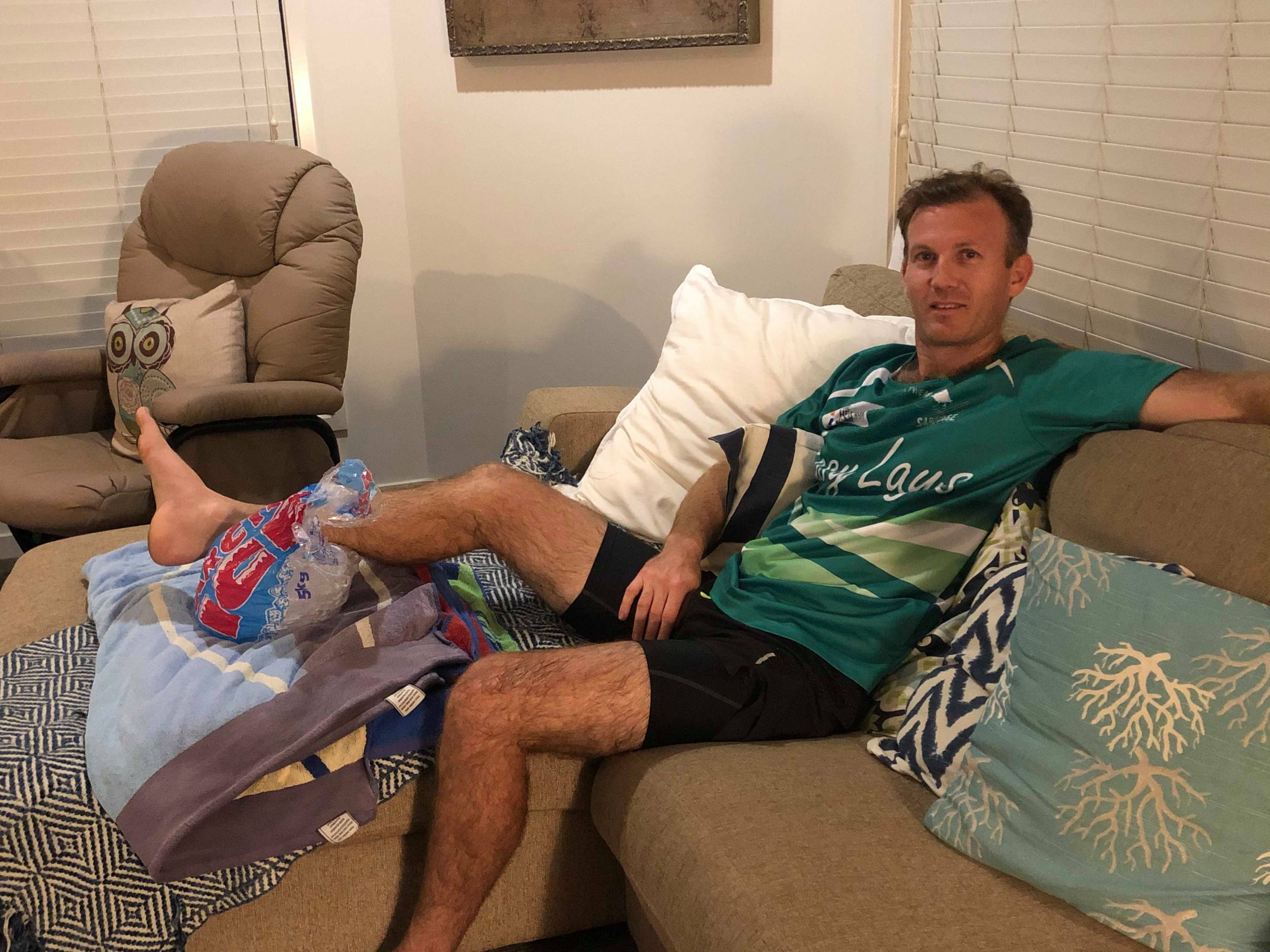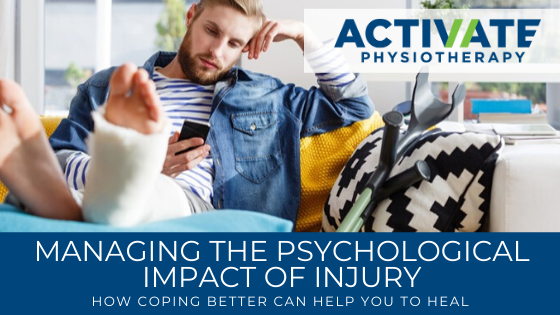As some of you may be aware I’ve had an injury of my own to deal with lately in that of a ruptured Achilles. From having some restricted mobility and facing a 12 month recovery, even I am not able to avoid the psychological ups and downs that come with this injury and its impact on my busy life. It’s from my own challenges that I have decided to write about this topic and provide some useful information on what common psychological impacts an injury has on a person and what are some helpful strategies in dealing with it. Now I am not a psychologist but over my years of working with clients and helping them rehabilitate from a range of injuries there is an important role we Physio’s must take in helping counsel people through this because if we don’t address this then we cannot fully rehabilitate a physical injury. If we don’t have the mind or right mindset ‘on our side’ then it is unlikely we will get a good result. The main points I am going to talk about below are being realistically positive/optimistic or having hope, taking control and support networks. For simplicity I will generalise about what type of injury I am referring to but this is mostly based around a more serious musculoskeletal injury which is not something that will get better in just a matter of weeks but is one that may take months to years and needs to go through a reasonable process of healing or becomes permanent and therefore impacts a person’s day to day function. However some of what I speak about could be used in different situations in life and not just recovering from a physical injury.

When you initially sustain an injury you will likely end up in shock and wonder about many things like what has actually happened and how serious is it as well as what should you do next and will you get better? It may seem obvious when reading this or to people on the outside of your situation but getting the right help as soon as possible from an expert is a very important first step. When you’re in shock your brain feels like it turns to ‘mush’ and is not capable of making normal rational decisions or good decisions about what you do next. It is very easy to also become overwhelmed at various points in the initial stages as you struggle to process what is going on. Having more than one expert’s recommendations on helping you develop a management plan is highly recommended. Once you have your plan you can normally start to overcome some of the shock and anxiety that occurs first up and I’ll explain more about this.
As your shock settles, you will likely still have underlying anxiety and stress about how it’s actually going to go and that’s quite normal. The next step is about getting a better understanding of the process and possible outcomes. Being educated on this topic then helps liberate more anxiety and stress and allows you to start to change your focus to things you can control. Up to this point there has not been too much you feel like you can control and hence the feelings of anxiety and stress. It’s important to work through these initial parts as quickly as possible because your state of mind up to this point has not been ideal for healing and higher levels of stress do actually produce higher levels of cortisol in the body which impacts healing negatively. Once you can focus on the process and things you can control you should try to reduce your worry about the bigger picture and things you can’t control.
Taking your advice from experts and not Dr Google or even worse your well-meaning friends and family is highly recommended. We all know people who love to talk about “that person” they know with a similar injury, and then proceed to regale you with a disaster story, entertaining as it may be it certainly doesn’t help your state of mind. All this does is shifts your focus back to bad outcomes and things you can’t control and brings your mind into a more negative mindset which again is bad for healing.
If you find yourself having trouble shifting away from being in a negative mindset and thinking about the worst possible outcomes, then I recommend trying to get some perspective. If you start by looking at your injury in relation to the bigger picture of your life, then something like this is really a small part of it. It can also help to see these things as a challenge you need to face to help you grow as a person. Most of our negative experiences in life cause us to go through the most development and also form as character building activities, so seeing this in a more positive way and flipping the negative to a positive can really help tackle this situation with a better outlook or mindset. The other way to use perspective

o help you achieve a better mindset is being able to empathise with people who go through worse things and perhaps have more permanent conditions or disabilities. Remember, somebody is usually worse off than you, and if it helps you develop more sympathy and empathy for others then you won’t focus so negatively on your own situation. All of this perspective stuff should help you appreciate what you have in your life and what you can look forward to once things improve. Having this type of hope will help you ultimately heal better.
Now I don’t think it’s realistic to be ‘happy’ or positive all the time because that’s just not normal. The people who I have observed who do the best are realistically optimistic or accept what has happened and try to get the best out of the situation. These people also look to take control of what they can and are accepting of multiple different outcomes. The other thing the best people do in this situation is use their understanding of the process and then reshape their short term and/or long term goals in life and work etc. to take into account their injury and any limitations they have which will make achieving their goals either not possible or delayed. If you can do this with your family or significant other then it will help everyone be on the same page. If you have little people in your life then sit down and explain to them what is going on and why you won’t be able to play the same games with them but you will find new ones or other ways to have fun and spend time together. Kids on a whole are mostly understanding if they can see you are injured and you take the time to talk to them about it.
The other part you need to come to terms with is that for most 12 month injuries you will be in for a bumpy ride, because not everything goes as it should. Obviously if you don’t anticipate this then it hits you pretty hard when it happens and ultimately drives you to a more negative outlook. To me this is no different to life in general. By now you should be comfortable knowing that things don’t always go as you want them to and prepare for or anticipate this. In a lot of ways I feel that in society we are becoming more narcissistic and feel like we expect everything to go the way it should for us because ‘I am the most important person in the world’ – well guess what? You ain’t, and I ain’t either! hahaha. To get through this process whilst maintaining a better mindset you will need to adjust your beliefs around this. The best strategy to use when faced with a challenge or bump in the road is to get the experts advice and focus on the process and the parts you can control.
For injuries that take away some level of function or loss of a different sort, for example, a career, either in the short term or long term, it is normal to go through some or all of the 5 stages of grief depending on the extent of your injury. My experience is that you will likely feel angry at some point, which is also normal and part of the process. This is when you will need to be aware of your own coping mechanisms in dealing with this and do your best to work through it. You will also need to try really hard to not take it out on your support network because you are going to need them. For me I use exercise, listening to music or talking to someone to help me settle down.
Therefore, one of the single best strategies you can use to help yourself and your mindset in the long recovery period is resume as much of your normal everyday life and work life as quickly as possible. It is widely known that returning to work in any capacity will help you psychologically. From my point of view as a Physio this has been so obvious but also so beneficial.
One of my challenges is that my mobility is restricted and I have had to lean on friends and family for assistance. And this is the final point I want to raise, that having a support network around you is very important, both to help you with day to day logistics but also give you extra inspiration and a pep up when you need it. If your support network is not as immediately obvious as a spouse or partner, it is likely that at some point a random act of kindness will come your way from an outside source. When this happens consider swallowing your pride and accept this help to either help yourself or take pressure off the people helping you the most. Remember people actually feel good helping others so don’t push this away cause it likely won’t come back to you when you do need it the most.
Finally, I cannot avoid saying if you are feeling down then it is important to speak to someone and that may be a partner or a friend but also may be a health professional if you are suffering badly. I can say this, being a male myself, to be honest most men don’t do this AT ALL or if they do, they don’t do it particularly well. But burying your head in the sand is not going to help anyone, least of all yourself and as we said getting the best mental frame helps you the most in your recovery.
I hope some of this information is of benefit in helping you recover. Please follow us on facebook or check out our website where I will share more of my journey and the modifications I have made in my work and home life and also the strategies I am using to keep my mind optimistic.
Yours in health,
David Sandison

